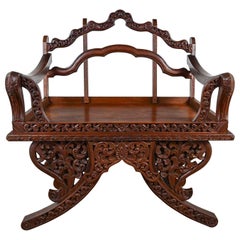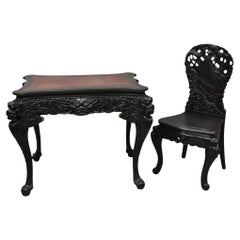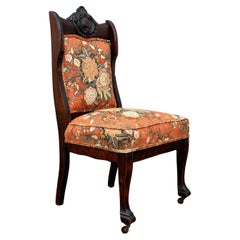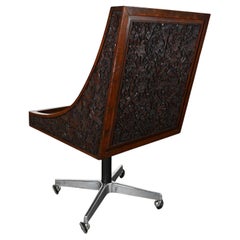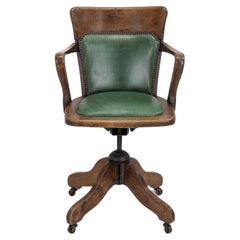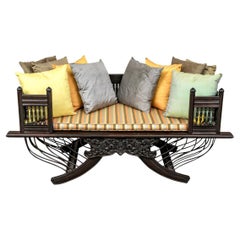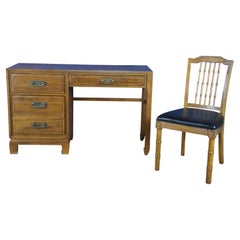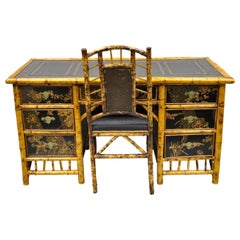Chinoiserie Office Chairs and Desk Chairs
Emerging in the 17th century, chinoiserie appropriated the aesthetics and imagery of popular East Asian design for European-made versions. Reflecting the exoticization of China, Japan and other countries in this era, the word directly translates from French to “Chinese-esque,” which reveals its shortcomings as a style of furniture and decor that often stereotypically and reductively mimics Asian culture rather than showcasing and paying tribute to its artistic traditions.
The enthusiastically decorative chinoiserie style was propelled by influential tastemakers including French King Louis XIV, whose Trianon de Porcelaine in 1670 was inspired by Chinese architecture. Expanded trade between the East and West led to a demand for porcelain, lacquer objects, silk and other goods, which further informed the fanciful furniture being crafted in Europe.
Artisans working in the chinoiserie style used materials and elements like pagoda shapes, bamboo, lacquer surfaces, bird and flower motifs and other interpretations of Asian design on pieces that were frequently set against vibrant wallcoverings. This whimsical approach yielded chinoiserie furniture that boasted dramatic flourishes drawing on the natural world and reflected the dominance of Rococo during the 18th century.
As chinoiserie was shaped by approximations of Asian design by European creators, it had regional variations, such as Chinese Chippendale in England where cabinets, chairs and tea tables had wooden fretwork designs and “japanned” surfaces intended to resemble lacquer work that was created in East Asia. In North America, furniture makers in Boston and New York integrated chinoiserie-painted scenes into Queen Anne furniture.
Antique chinoiserie furniture has continued to be fashionable, from its popularity with decorators of the Hollywood Regency era — James Mont, Tommi Parzinger, William Haines and Samuel Marx favored the style — to contemporary interior designers, although it brings with it a complex history.
Find a collection of chinoiserie bedroom furniture, cabinets, decorative objects and more on 1stDibs.
Mid-20th Century Thai Chinoiserie Office Chairs and Desk Chairs
Rosewood
Late 19th Century Unknown Antique Chinoiserie Office Chairs and Desk Chairs
Wood
Late 19th Century French Antique Chinoiserie Office Chairs and Desk Chairs
Upholstery, Wood
Mid-20th Century Thai Chinoiserie Office Chairs and Desk Chairs
Aluminum, Steel
Early 20th Century English Chinoiserie Office Chairs and Desk Chairs
Leather, Oak
1970s Asian Vintage Chinoiserie Office Chairs and Desk Chairs
Wood
1980s Italian Vintage Chinoiserie Office Chairs and Desk Chairs
Metal
20th Century Brazilian Chinoiserie Office Chairs and Desk Chairs
Metal
1920s Thai Vintage Chinoiserie Office Chairs and Desk Chairs
Bouclé, Teak
Late 19th Century English Antique Chinoiserie Office Chairs and Desk Chairs
Mahogany
19th Century English Antique Chinoiserie Office Chairs and Desk Chairs
Brass
1970s Vintage Chinoiserie Office Chairs and Desk Chairs
Other
Early 2000s American Chinoiserie Office Chairs and Desk Chairs
Aluminum
1960s Danish Vintage Chinoiserie Office Chairs and Desk Chairs
Fabric, Rosewood
1890s English Antique Chinoiserie Office Chairs and Desk Chairs
Upholstery, Wood
1950s English Vintage Chinoiserie Office Chairs and Desk Chairs
Leather, Beech
Late 20th Century Chinoiserie Office Chairs and Desk Chairs
Faux Bamboo, Teak
Late 19th Century English Antique Chinoiserie Office Chairs and Desk Chairs
Leather, Bamboo, Paint
Late 19th Century English Antique Chinoiserie Office Chairs and Desk Chairs
Leather, Bamboo, Paint
Early 20th Century American Chinoiserie Office Chairs and Desk Chairs
Wood
Mid-18th Century English Antique Chinoiserie Office Chairs and Desk Chairs
Mahogany
Early 20th Century Japanese Chinoiserie Office Chairs and Desk Chairs
Lacquer
